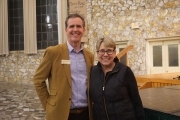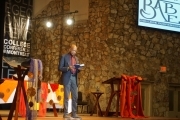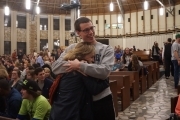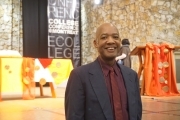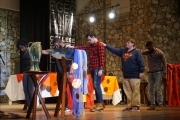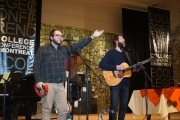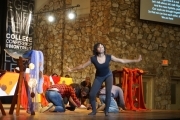Annual Montreat gathering urges young adults to become a unified community of faith
February 22, 2017
As over 1,000 college students and their advisors rushed the doors of Montreat Conference Center’s Anderson Auditorium on January 2 for the annual College Conference’s opening worship, Frisbees featuring the logo of UKirk — the Presbyterian Mission Agency’s collegiate ministries network—flew overhead.
The energy level at the gathering—as high as the soaring Frisbees—continued throughout the evening as attendees were introduced to the conference theme, “Beyond Babel,” based on Genesis 11:1–9. The 2017 conference was designed to help participants see in the ancient text “how God gave an ancient people a holy nudge towards diversity” as they are challenged to consider how God is similarly nudging God’s people today.
After welcoming conference-goers, co-director Amy Kim Kyremes-Parks, director of spiritual formation at Fairmount Presbyterian Church in Cleveland Heights, Ohio, prepared them to “be uncomfortable” as they are challenged and reminded throughout the week “that we are surrounded by a broken world.”
Pointing toward a host of banners originally created for Montreat’s 2016 DisGrace Conference: “Seeking God’s Grace Amid the Disgrace of Racism,” Kyremes-Parks explained that they contained the names, some known, some unknown, of victims of violence.
“We need to remember these names,” she said, “because one name is too many names. We borrowed these banners as a reminder to us that we need to heal our world, to recognize that what we’re doing here has an effect on eternity.”
During her welcome, Kyremes-Parks also introduced the conference’s three critical conversation leaders, the Rev. Andrew Wilkes, Jessica Vazquez Torres, and David LaMotte, describing them as “good shepherds” whose role is to help participants process the material presented at the conference. “Their job is also to challenge us,” she said.
Since Montreat launched its first College Conference in 1994, which grew to just over 500 attendees by 2007, its attendance doubled over the next 10 years. Registration for this year’s gathering exceeds 1,040. Montreat’s largest college conference was in 2016, when nearly 1,140 attended. [KB1]In bringing greetings to the gathering, Richard DuBose[KB2], president of Montreat Conference Center, especially welcomed those in Montreat for the first time.
“If you’ve heard about Montreat as a special place, it’s true,” said DuBose, “because God is always doing something new and different in Montreat. You’re not just coming to receive something, but also to contribute something.”
DuBose also invited the gathering to acknowledge and thank the planning team, staff, and the many volunteers who made the conference possible. “I love coming up here and doing this, particularly because it’s the last thing I have to do this week,” he said with a smile. “Then I get to sit on the back row like a good, frozen Presbyterian.”
As worship began, with spirited singing by conference music leaders Sam Burchfield and Zach Wells and poignant liturgy, conference preacher the Rev. Paul Roberts Sr., president of Johnson C. Smith Theological Seminary in Atlanta, read the evening’s two Scriptures, Genesis 11:1–9, where “the Lord confused the language of all the earth,” and Acts 2:1–13, the Pentecost story. Then, softly intoning the words “Go together, go together,” he began to preach.
Roberts started by advising the gathering that the story of the Tower of Babel is “a peculiar passage for us modern-day readers,” and he classified the passage as myth.
“Now please don’t go home and tell everyone that the preacher told us that the Bible is a bunch of made-up stuff,” Roberts said to laughter. “We use this word ‘myth’ in the best possible sense of the word. This particular type of literature is not aimed at presenting history but truth, about God and how God’s people function in the world.”
Referring to the Babel account, Roberts emphasized the breakdown in communication, with people not understanding each other and giving up, leaving the tower unfinished.
“They gather themselves into like-minded circles,” he preached. “They move around the rest of the globe, each speaking their own unique language. By contrast, the passage from the Acts of the Apostles gives us the story of Pentecost, where the Holy Spirit showed up and suddenly there was a commonality in speech. They have the power to understand one another.”
The 2,000-plus-year movement called Christianity, “of which you and I are descendants, emerged from these people coming together in language, in mission, in service, in purpose,” Roberts said.
Noting the clear presence of God in both passages, he added that human beings “are wired to regard a higher power.”
“We don’t do anything irrespective of the power of God,” Roberts declared. “And in the natural order of creation, there is diversity; you can’t get around it. God done it—it is what it is. We can build our own little like-minded communities if we want to, but the world is a mighty diverse and mighty fine place.”
In the Old Testament account, the people were scattered. In the New Testament passage, the people, while not all the same, became a unified community by the power of the Holy Spirit.
“If you take one thing from the sermons, it is this, where true unity exists: If there is diversity of ideas, background, age, class, gender, orientation, all of these working together toward a unified community, that’s when the potential for achievement is at its highest.”
With an account from his own experience, Roberts then advised the gathering not to confuse unity with conformity. He spoke of a close friend who had invited Roberts and his family to church with the words “This isn’t the 1950s; you all just come to church with me.”
“What she was essentially saying was, ‘You’re black; I’m white. I’m accustomed to my norms as a white person, and we don’t discriminate, so you, black man, come on over and be like us,’” Roberts said. “That’s not diversity; that’s conformity. We’re not called to conformity. This conference is about unity in the midst of diversity—unity that honors and respects difference in all of its many facets.”
After paraphrasing a portion of Senator Cory Booker’s speech at last year’s Democratic National Convention in Philadelphia — “We are better together; when we are divided, we are weak; when we are united, we are indivisible, we are invincible”— Roberts explained that “this is the story of the Tower of Babel, and this is the story of Pentecost, and God is in the midst, beckoning us every day.”
He then closed with an African saying, “If you want to go fast, go alone. But if you want to go far, go together.”
“In the midst of our diversity, as we strive to be a unified community of faith, a unified country,” he said, “it’s up to you to determine to go together.”
Emily Enders Odom, mission communications strategist
Today’s Focus: Young Adults
Let us join in prayer for:
PC(USA) Mission Co-workers
Jan Heckler, Madagascar
Joshua Heikkila, Ghana
PC(USA) Agencies’ Staff
Brenda Stoney, PMA
Andrea Stopper, PMA
Let us pray:
Loving God, stand with us all, we pray. Remind us to notice, encourage, and listen, and inspire us to lead with your Son’s heart. Teach us again how to follow, how to learn, how to lead—all in your merciful manner. Amen.
Daily Readings
Morning Psalms 65; 147:1-11
First Reading Ruth 2:1-13
Second Reading 2 Corinthians 1:23-2:17
Gospel Reading Matthew 5:21-26
Evening Psalms 125; 91
![]() You may freely reuse and distribute this article in its entirety for non-commercial purposes in any medium. Please include author attribution, photography credits, and a link to the original article. This work is licensed under a Creative Commons Attribution-NonCommercial-NoDeratives 4.0 International License.
You may freely reuse and distribute this article in its entirety for non-commercial purposes in any medium. Please include author attribution, photography credits, and a link to the original article. This work is licensed under a Creative Commons Attribution-NonCommercial-NoDeratives 4.0 International License.
